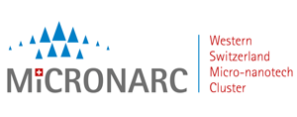mAm 2024 is organised by Micronarc, in collaboration with Karlsruhe Institute of Technology (KIT).
Organising Committee
- Edward Byrne – Deputy Director FSRM
- Philippe Fischer – Director, FSRM
- Roland Hirschi – Secretary General, Micronarc
- Sikha Ray – KIT, Programme management STN
- Volker Saile – Karlsruhe Institute of Technology
- Céline Bernasconi – Micronarc, FSRM
About Micronarc
Micronarc is the dedicated micro-nanotech cluster and communication platform created by the governments of the seven cantons that constitute Western Switzerland. Its primarily role is the development and promotion of the regional scientific, industrial and economic base in the sectors of micro and nanotechnology, as well as its educational structures, R&D facilities, technology transfer and inward investment.
To achieve its objectives, Micronarc manages and operates its internet portal www.micronarc.ch, organises grouped booths at industry trade shows and scientific conferences; organises professional and public events locally; provides information and networking possibilities and acts as a facilitator in establishing business relations.
Federal Department of Economic Affairs, Education and Research (DEFR) State Secretariat for Economic Affairs (SECO)
 Micronarc is an initiative of the cantons of Fribourg, Vaud, Valais, Neuchâtel, Geneva and Jura, supported by SECO under the NRP program.
Micronarc is an initiative of the cantons of Fribourg, Vaud, Valais, Neuchâtel, Geneva and Jura, supported by SECO under the NRP program.
About the FSRM
FSRM – Crossroads of Microtechnology
The FSRM promotes micro technology and its applications with offers in continous education, project management and organization. The FSRM is the Executive Secretary for Micronarc.
About Karlsruhe Institute of Technology (KIT)

Karlsruhe Institute of Technology (KIT) has been a co-organiser of the mAm conference since the first edition.
The Karlsruhe Institute of Technology (KIT) is “The Research University in the Helmholtz Association.” As the only German university of excellence with a national large-scale research sector, we offer our students, researchers, and employees unique learning, teaching, and working conditions. The roots of the academic education institution extend all the way back to 1825. Today’s structure of KIT is the result of the merger of the Technical University of Karlsruhe and Karlsruhe Research Center in 2009



